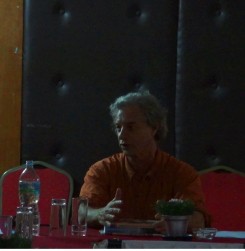
An Evening with Author Jeff Greenwald

American travel writer, author and journalist Jeff Greenwald spoke about his writing career and his association with Nepal in an interaction organized today by Media Foundation.
He fell in love with Nepal during his visit here in 1979 and started writing about the country.
Greenwald’s books on Nepal include Mr Raja’s Neighborhood: Letters from Nepal (1986), Shopping for Buddhas (1990) and Snake Lake (2010). He has also contributed to the New York Times magazine, Wired, Outside, CNN, Salon.com, BBC and other outlets.
The author said the American media provides tremendous news coverage of Nepal if there is an avalanche or blockade or earthquake. “The problem is, the day-to-day infighting in the government here is not covered,” he said.
Greenwald said that travel writing has changed as a genre. When he came to Nepal in the late seventies and eighties, the world wasn’t connected the way it is now. Places looked more exotic and foreign. So the travel writing trend was to romanticize them.
For his most recent travel writing, he said he is pursuing stories from Nepal about people doing different interesting projects.
Greenwald observed that new media technologies have made the world a global village, opening up great opportunities for writers, but with technologies, people also lose human contact and everything risks looking the same.
Greenwald is in Kathmandu as a featured writer for the Himalayan Writers’ Workshop that begins on Monday. The plan is to organize the workshop annually and possibilities for local collaboration and participation are there, he said.
Responding to a question on the quality of English writing in Nepal’s press, he said: “Excellent. Recently I was reading a movie review. It was good enough to be in any American newspaper.”
He described the quality of English writing by Nepali authors such as Manjushree Thapa and Samrat Upadhyay as “great”. “But I like books about the plight of the people,” he said, while sharing the story of a writer who spent three years living in the slums in Mumbai, India, to write for The New Yorker. The work won every award.
Co-founder and executive director of Ethical Traveler, a California-based non-profit organization, Greenwald said travel is now one of the world’s largest industries, worth trillions of dollars. Travel has a way to use the carrot approach to promote human rights and environment, so Ethical Traveler incentivizes countries through awards to do so. Nepal has not been on the list so far.
He sees both disappointing and encouraging things happening in Nepal. The good things about Nepal, according to him, are an improved human rights situation, women’s empowerment, and NGOs working from the bottom up.
On the downside, he said: “Sorry, if I’m speaking too frankly; it’s the level of corruption. And the hardest question to answer for anyone right now would be what does it mean to be a Nepali?” What is missing is one collective, overarching vision that unites Nepal and Nepali people. In the past, these used to be something like ‘the only Hindu kingdom’ or ‘the King’.
He suggested that the idea of unity in diversity is very unique to Nepal. Embracing that diversity and uniting in this vision could be a way forward.
Where does the author see Nepal heading? “In some ways, I see Nepal is going into the post-government situation, communities coming together to rebuild after the earthquake.”
© Media Foudation- 2024 | Site by: SoftNEP